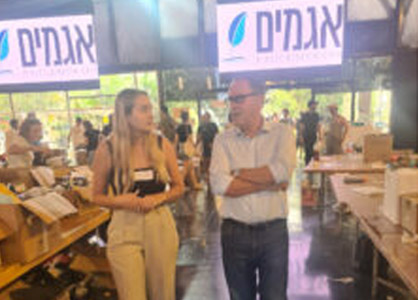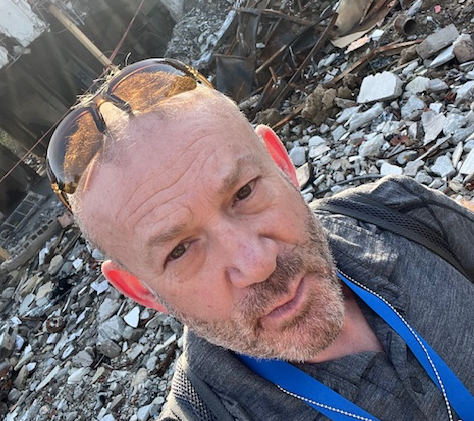
Workplace Noise-Related Hearing Loss Can Cause Sleep Problems
Workplace Noise-Related Hearing Loss Can Cause Sleep Problems
January 25, 2011
BEER-SHEVA, ISRAEL, January 25, 2010 – Sustained exposure to loud workplace noise may affect quality of sleep in workers with occupational-related hearing loss, according to a new study by Ben-Gurion University of the Negev researchers.
Published in the journal Sleep, the study compared the sleep quality of individuals at the same workplace, some with workplace noise-related hearing loss and some without.
Workers with hearing loss had a higher average age and longer duration of exposure than those without hearing impairments. Also, 51 percent of those with hearing loss reported tinnitus (continual ringing in the ears) as opposed to 14 percent of those without hearing impairments.
Although tinnitus was reported as the main sleep disrupting factor, hearing impairment among workers exposed to harmful noise contributed to sleep impairment, especially to insomnia, regardless of age and years of exposure.
“The homogeneous study population exposed to identical harmful noise at the same workplace allowed us to compare sleep quality between similar groups differing only by hearing status,” explains Tsafnat Test, a medical student who carried out this study as her B.Sc. thesis in the BGU Faculty of Health Sciences, supervised by Dr. Sheiner, Dr. Eyal, Dr. Canfi and Prof. Shoham-Vardi.
Two hundred and ninety eight male volunteers with occupational exposure to harmful noise were given a hearing test prior to the start of study. Ninety-nine of the participants were judged to have a hearing impairment and 199 had normal hearing.
The researchers explored various elements of sleep including difficulty falling asleep; waking too early or during the night; excessive daytime sleepiness or falling asleep during daytime; snoring; and excessive sleep movement.
The Influence of Hearing Impairment on Sleep Quality among Workers Exposed to Harmful Noise
Tsafnat Test 1, Ayala Canfi, Ph.D. 2; Arnona Eyal, M.D. 3; Ilana Shoam-Vardi, Ph.D. 4; Einat K. Sheiner, M.D. 5
1 – Health Science Department, Ben-Gurion University of the Negev, Beer-Sheva, Israel;
2 – Nuclear Research Center, Negev, Dimona, Israel, Department of Epidemiology and Health Systems Evaluation, Ben-Gurion University of the Negev, Beer-Sheva, Israel;
3 -Occupational Medicine Clinic, Clalit Health Services, Beer-Sheva, Israel;
4 – Department of Epidemiology and Health Systems Evaluation, Ben-Gurion University of the Negev, Beer-Sheva, Israel;
5 – Nuclear Research Center, Negev, Dimona, Israel
ABOUT AMERICANS FOR BEN-GURION UNIVERSITY
By supporting a world-class academic institution that not only nurtures the Negev, but also shares its expertise locally and globally, Americans for Ben-Gurion University engages a community of Americans who are committed to improving the world. David Ben-Gurion envisioned that Israel’s future would be forged in the Negev. The cutting-edge research carried out at Ben-Gurion University drives that vision by sustaining a desert Silicon Valley, with the “Stanford of the Negev” at its center. The Americans for Ben-Gurion University movement supports a 21st century unifying vision for Israel by rallying around BGU’s remarkable work and role as an apolitical beacon of light in the Negev desert.
About Ben-Gurion University of the Negev
Ben-Gurion University of the Negev embraces the endless potential we have as individuals and as a commonality to adapt and to thrive in changing environments. Inspired by our location in the desert, we aim to discover, to create, and to develop solutions to dynamic challenges, to pose questions that have yet to be asked, and to push beyond the boundaries of the commonly accepted and possible.
We are proud to be a central force for inclusion, diversity and innovation in Israel, and we strive to extend the Negev’s potential and our entrepreneurial spirit throughout the world. For example, the multi-disciplinary School for Sustainability and Climate Change at BGU leverages over 50 years of expertise on living and thriving in the desert into scalable solutions for people everywhere.
BGU at a glance:
20,000 students | 800 senior faculty | 3 campuses | 6 faculties: humanities & social sciences, health sciences, engineering sciences, natural sciences, business & management, and desert research.
For all press inquiries, please contact:
James Fattal, J Cubed Communications
516.289.1496



